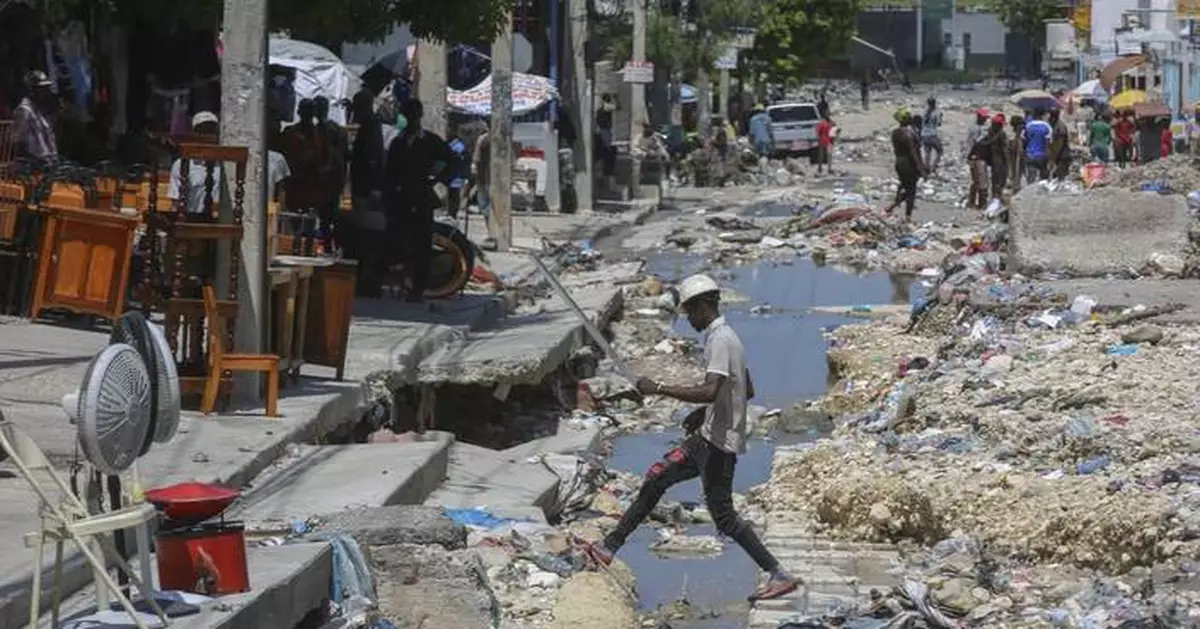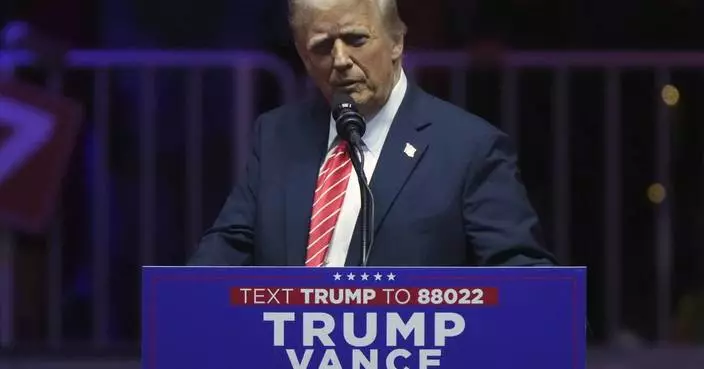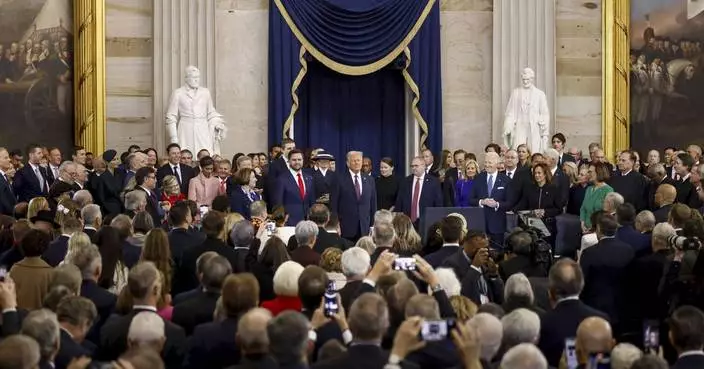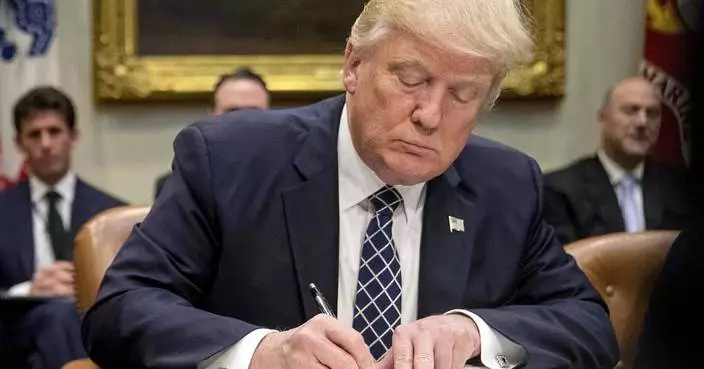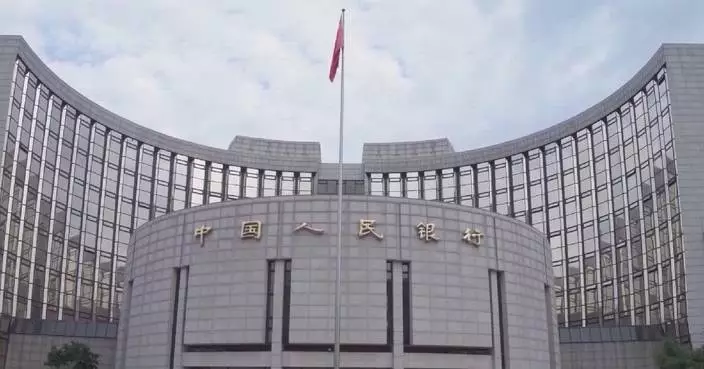SAN JUAN, Puerto Rico (AP) — Haiti’s government on Wednesday created a provisional electoral council long sought by the international community to prepare the troubled Caribbean country for its first general elections since 2016.
Smith Augustin, a member of the country's transitional presidential council, confirmed to The Associated Press that the electoral council was created, albeit with only seven of what by law is supposed to be a nine-member panel. He said the two other members would likely be announced in upcoming days.
The electoral council, which represents groups including farmers, journalists, human rights activists and the Vodou community, is tasked with organizing the elections and helping create the legal framework to hold them.
Haiti has not had a president since July 2021, and it last held elections in 2016.
The previous electoral council had been dissolved in September 2021 by former Prime Minister Ariel Henry, who accused it of being “partisan.” His move delayed elections planned for November 2021 and prompted critics to accuse Henry of holding on to power, accusations he rejected.
Henry was himself a transitional leader. He was sworn in as prime minister roughly two weeks after former President Jovenel Moïse was assassinated at his private home in July 2021. Henry repeatedly pledged to hold elections but blamed worsening gang violence for his failure to do so.
Earlier this year, gangs that control 80% of the capital of Port-au-Prince launched coordinated attacks on critical government infrastructure, a move that eventually led to Henry’s resignation.
A transitional presidential council was then created and tasked with holding presidential elections by February 2026.
The assassination of Moïse had left a major political vacuum.
In addition, the terms of 10 remaining senators expired in January 2023, stripping Haiti of its last democratically elected institution. The country had failed to hold legislative elections since October 2019, with Moïse ruling by decree before he was killed.
The newly formed provisional electoral council faces numerous obstacles, including persistent gang violence blamed for the killing of more than 3,200 people from January to May.
To help quell gang violence, nearly 400 Kenyan police arrived in Haiti earlier this year as part of a U.N.-backed mission that also expects to see the pledged deployment of soldiers and police from the Bahamas, Chad, Benin and Bangladesh.
Turf wars among gangs have left more than half a million people homeless in recent years, with thousands of Haitians forced to flee their homes, abandoning essential documents including ID’s needed to vote.
Government officials have been visiting makeshift shelters to provide new IDs, but many Haitians remain without one.
“How are people going to vote?” said Daniel Janvier, 40, who now lives at a shelter after gangs raided his home and forced him to leave everything behind. “Most of the people that I know in this area don't have an ID.”
Janvier, who is unemployed after losing his job at a factory making pants, said he had his doubts that the government would actually organize elections.
“I think all of this is a joke,” he said. “Thousands and thousands of people are spread out. They won’t know where to go and vote if they manage to have elections.”
Associated Press reporter Evens Sanon in Port-au-Prince, Haiti contributed.
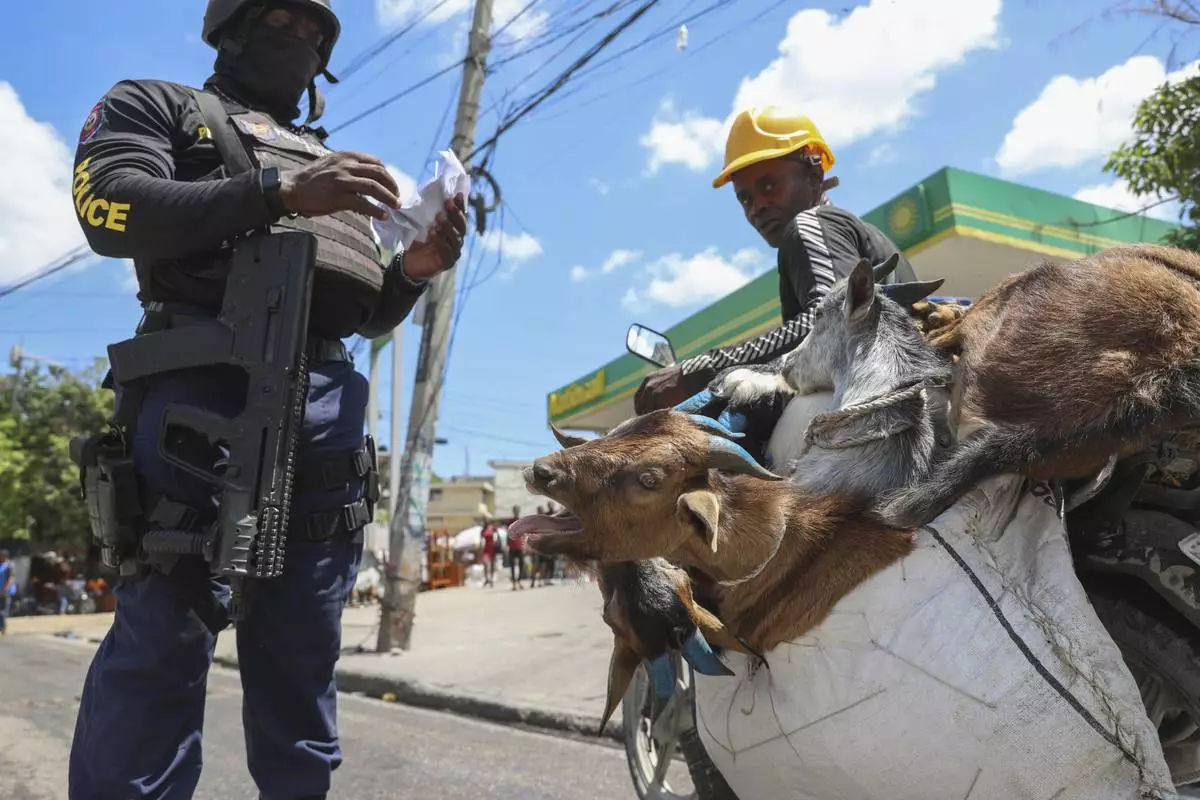
A police officer checks the receipt that shows the purchase of goats being transported on the back of a motorcycle in Port-au-Prince, Haiti, Friday, Sept. 13, 2024. (AP Photo/Odelyn Joseph)

People carry an empty coffin past a street food vendor into the shop that is buying it to repair and sell in Port-au-Prince, Haiti, Friday, Sept. 13, 2024. (AP Photo/Odelyn Joseph)
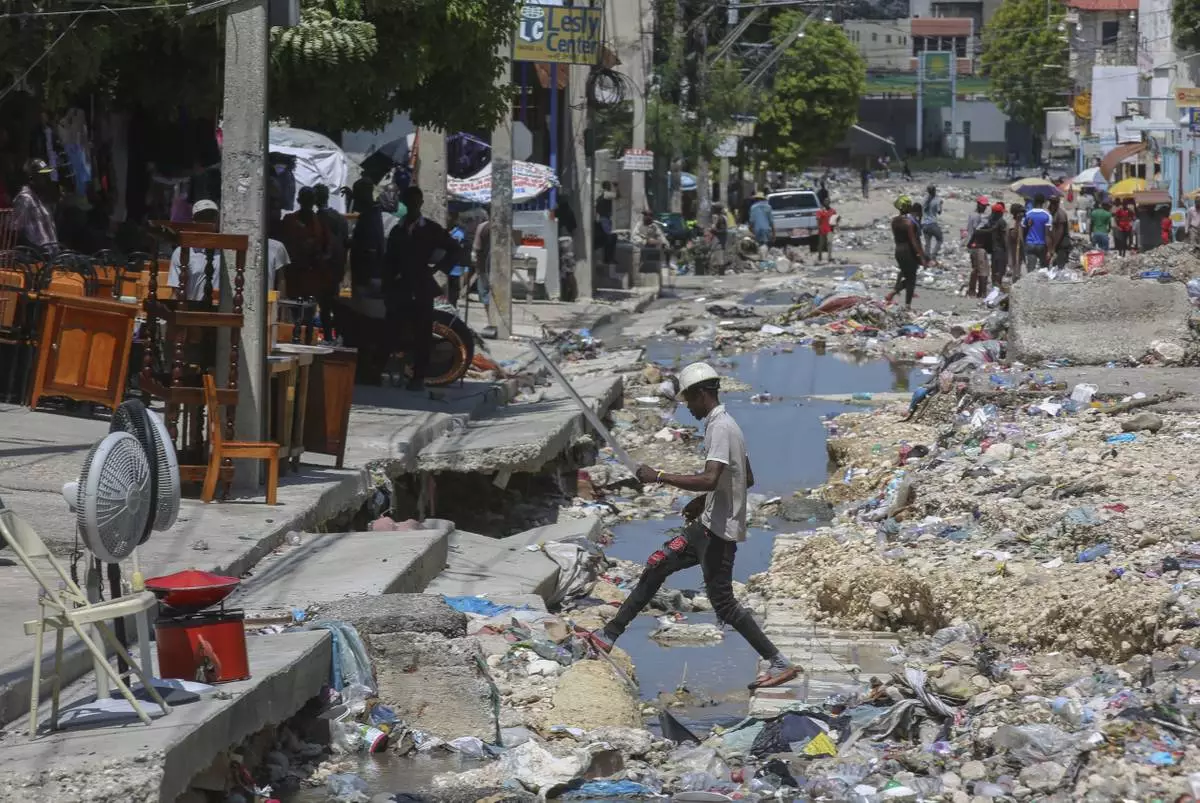
A man crosses a storm drain filled with trash in Port-au-Prince, Haiti, Friday, Sept. 13, 2024. (AP Photo/Odelyn Joseph)
WASHINGTON (AP) — The Senate quickly confirmed Marco Rubio as secretary of state Monday, voting unanimously to give President Donald Trump the first member of his new Cabinet on Inauguration Day.
Rubio, the Republican senator from Florida, is among the least controversial of Trump’s nominees and vote was decisive, 99-0. Another pick, John Ratcliffe for CIA director, is also expected to have a swift vote, as soon as Tuesday. Action on others, including former combat veteran and Fox News host Pete Hegseth for defense secretary, is possible later in the week.
“Marco Rubio is a very intelligent man with a remarkable understanding of American foreign policy,” Sen. Chuck Grassley of Iowa, the senior-most Republican, said as the chamber opened.
It’s often tradition for the Senate to convene immediately after the ceremonial pomp of the inauguration to begin putting the new president’s team in place, particularly the national security officials. During Trump’s first term, the Senate swiftly confirmed his defense and homeland security secretaries on day one, and President Joe Biden’s choice for director of national intelligence was confirmed on his own Inauguration Day.
With Trump’s return to the White House, and his Republican Party controlling majorities in Congress, his outsider Cabinet choices are more clearly falling into place, despite initial skepticism and opposition from both sides of the aisle.
Rubio, who was surrounded by colleagues in the Senate chamber, said afterward he feels “good, but there’s a lot of work ahead.”
“It’s an important job in an important time, and I’m honored by it,” Rubio said.
Senate Majority Leader John Thune moved quickly Monday, announcing he expected voting to begin “imminently” on Trump’s nominees.
Democrats have calculated it's better for them to be seen as more willing to work with Trump, rather than simply mounting a blockade to his nominees. They're holding their opposition for some of his other picks who have less support, including Tulsi Gabbard for director of national intelligence and vaccine skeptic Robert F. Kennedy Jr. for health secretary.
Senate Democratic Leader Chuck Schumer said his party will “neither rubber-stamp nominees we feel are grossly unqualified, nor oppose nominees that deserve serious consideration.”
Rubio, he said, is an example of "a qualified nominee we think should be confirmed quickly."
Senate committees have been holding lengthy confirmation hearings on more than a dozen of the Cabinet nominees, with more to come this week. And several panels are expected to meet late Monday to begin voting to advance the nominees to the full Senate for confirmation.
The Senate Foreign Relations Committee unanimously advanced Rubio's nomination late Monday. The Senate Armed Services Committee and Senate Intelligence Committee, respectively, voted to move the nominations of Hegseth and Ratcliffe. And the Homeland Security and Government Affairs Committee advanced nominees Kristi Noem as homeland security secretary and Russell Vought as director of the Office of Management and Budget, but with opposition.
Rubio, a well-liked senator and former Trump rival during the 2016 presidential race, has drawn closer to the president in recent years. He appeared last week to answer questions before the Foreign Relations Committee, where he has spent more than a decade as a member.
As secretary of state, Rubio would be the nation’s top diplomat, and the first Latino to hold the position. Born in Miami to Cuban immigrants, he has long been involved in foreign affairs, particularly in South America, and has emerged as a hawk on China’s rise.
During his confirmation hearing last week, Rubio warned of the consequences of America’s “unbalanced relationship” with China. While he echoes Trump’s anti-globalist rhetoric, Rubio is also seen as an internationalist who understands the power of U.S. involvement on the global stage.
Rubio cultivated bipartisan support from across the aisle, both Republicans and Democrats. He takes over for outgoing Secretary of State Antony Blinken, who has said he hopes the Trump administration continues Biden's policies in the Middle East to end the war in Gaza and to help Ukraine counter Russian nomination.
The Senate is split 53-47, but the resignation of Vice President JD Vance and, soon, Rubio drops the GOP majority further until their successors arrive. Republicans need almost all every party member in line to overcome Democratic opposition to nominees.
Objection from any one senator, as is expected with Hegseth and several other choices, would force the Senate into procedural steps that would drag voting later into the week.
Associated Press writers Farnoush Amiri and Mary Clare Jalonick contributed to this report.

President-elect Donald Trump's Cabinet picks, other nominees and appointments, pose for a photo at the National Gallery of Art in Washington, Saturday, Jan. 18, 2025. First row from left, Elise Stefanik, John Ratcliffe, Lori Chavez-DeRemer, Howard Lutnick, Pete Hegseth, Doug Burgum, Brooke L. Rollins, Marco Rubio and Robert F. Kennedy Jr.; second row from left, Scott Turner, Tulsi Gabbard, Sean Duffy, Linda McMahon, Lee Zeldin, Kristi Noem, Chris Wright, Doug Collins, Kelly Loeffler and Scott Bessent; and third row from left, Stephen Miran, Jamieson Greer, Kevin Hassett, Kash Patel and Russell Vought. (AP Photo/Mark Schiefelbein)
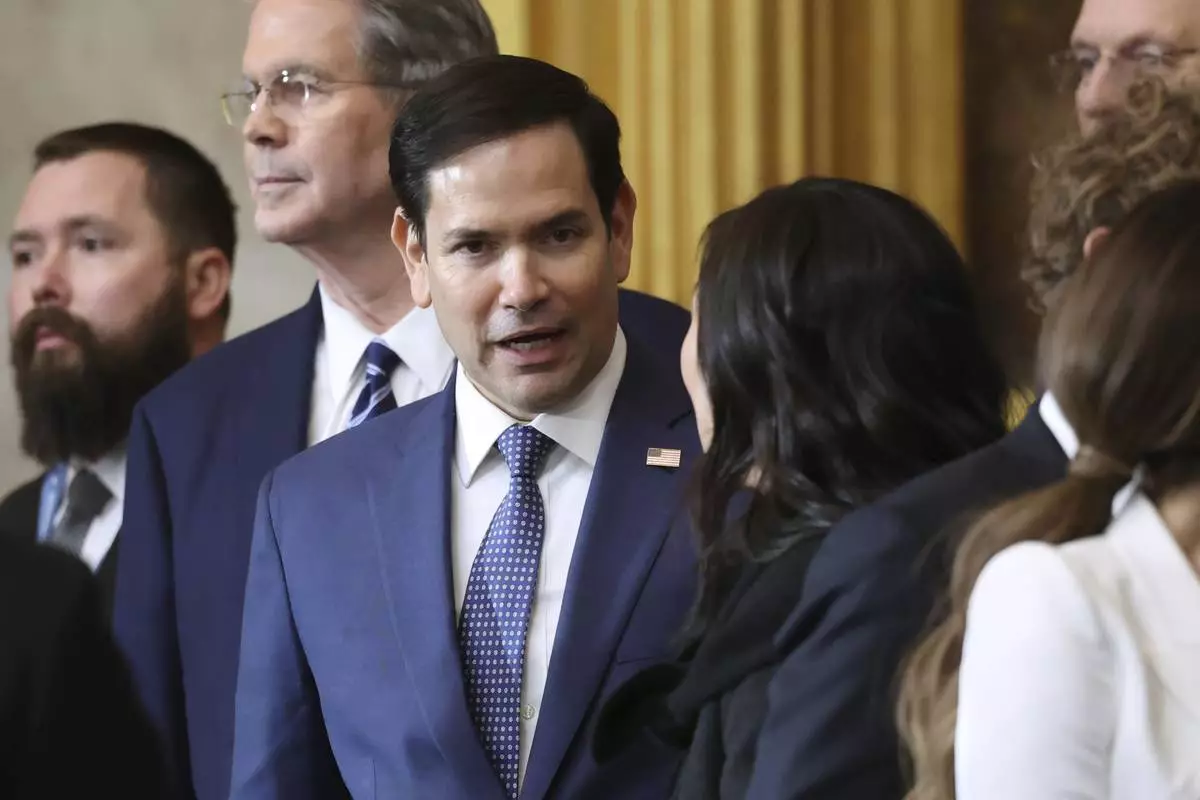
Sen. Marco Rubio, R-Fla., a nominee for Secretary of State, attends the 60th Presidential Inauguration in the Rotunda of the U.S. Capitol in Washington, Monday, Jan. 20, 2025. (Kevin Lamarque/Pool Photo via AP)





